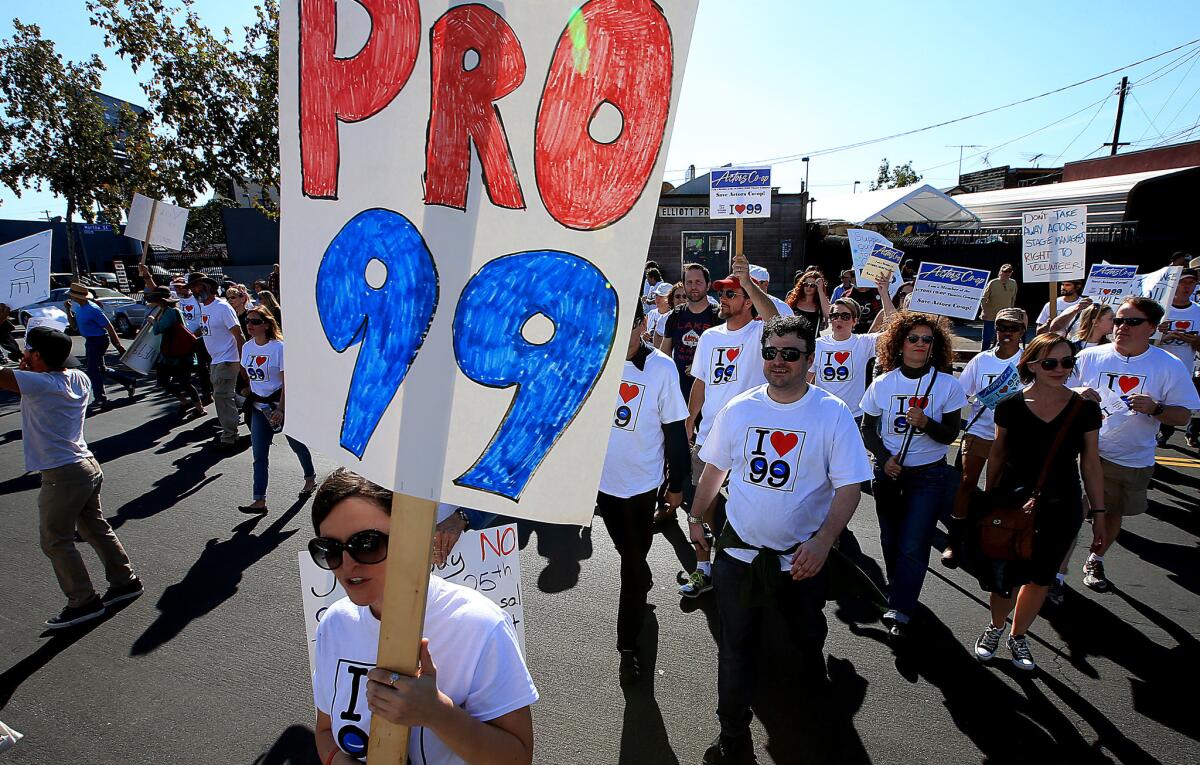Actors in Los Angeles file lawsuit against Actors’ Equity over wage hike

Members of Actors’ Equity Assn. gathered in March in North Hollywood to protest the union’s proposal to end the 99-seat theater plan in Los Angeles. That proposal has since been put into effect.
- Share via
A small group of actors and theater professionals in Los Angeles has filed a lawsuit against Actors’ Equity Assn. seeking to reverse the union’s new 99-seat theater plan, enacted in April.
The lawsuit, filed on Saturday in a Los Angeles federal court, claims that the new plan is detrimental to the L.A. theater community because it imposes a new minimum wage of $9 per hour for union members who perform in L.A. theaters with fewer than 100 seats.
Plaintiffs are claiming breach of contract and are arguing that the new minimum wage would be financially burdensome for many small theaters.
“Many will close altogether,” the lawsuit states. “All will have greater difficulty producing original works. Some have already decided to present fewer productions with smaller casts beginning in 2016, and many will turn to the world of non-union actors.”
When reached for comment on Monday, a spokeswoman for the New York-based Actors’ Equity sent a statement saying that the union “is fully prepared to defend both the process and substance” of the decision.
“It is disappointing that this prolonged process has now resulted in what will surely be a very expensive litigation for Equity,” the statement read.
“Unfortunately, the real victims here are the members all over the country who understand that when a single community files costly lawsuits and buys full page ads in major newspapers to insist that they should not be paid, it has an inevitable and deleterious effect on the union’s bargaining power for the rest of its members.”
The lawsuit lists 18 plaintiffs, including actors, directors and producers. Among the prominent names are Ed Harris, Amy Madigan, Ed Asner, French Stewart and Tom Bower.
An attorney for the plaintiffs said separately that the suit has been filed in court but hasn’t been officially served to the union yet.
“We want to give the union the opportunity to look at our complaint and realize that actors are serious about this,” said Steve J. Kaplan, who represents the plaintiffs, in an interview.
He said that if that course proves fruitless, the plaintiffs will ask the court to rescind the union’s decision and ask for a new collective bargaining agreement. However, he later said that they aren’t seeking a new agreement but an order that future substantial changes be made in compliance with the previous agreement.
The lawsuit isn’t being filed by any single theater company or actors’ organization.
Rather, Kaplan said, the plaintiffs represent “a cross section of actors who are both successfully commercial and some who are not who feel very strong about this issue and who have come forward.”
“We are terribly disappointed that our union rejected the principle of democracy on which it was founded,” said actor Michael A. Shepperd, a plaintiff in the suit, in a statement, “and foisted on union members new rules that will harm all actors in the long run.”
For years, small theaters in L.A. have operated under a so-called Equity Waiver Agreement, under which theater companies could pay actors as little as a $7 per day stipend. The agreement stems from a 1989 legal settlement with the union.
In April, local actors voted approximately 2-to-1 against the new wage hike. But the union went ahead with the increase. The new minimum wage for rehearsals and performances is expected to go into effect June 1, 2016.
The lawsuit claims that Actors’ Equity has breached its 1989 contract, which the suit claims provides for democratic and due process procedures for change.
It also claims that Actors’ Equity violated parts of the Labor Management Reporting and Disclosure Act, the 1959 act that provides certain rights to union members. The plaintiffs are claiming that they were deprived of the equal right to participate in changes to the payment agreement.
In addition to seeking a reversal of the union’s minimum wage hike, the plaintiffs are seeking unspecified damages.
The new rules provide for some exceptions to the new $9 per hour minimum wage. For instance, local L.A. theaters that qualify as “membership companies” -- stage organizations that are structured around a core ensemble of member actors -- may not have to comply with the new rules.
“We’re not saying there should never be change,” said Kaplan, the attorney for the plaintiffs. “But change needs to happen with everyone’s rights respected.”
Twitter: @DavidNgLAT
More to Read
The biggest entertainment stories
Get our big stories about Hollywood, film, television, music, arts, culture and more right in your inbox as soon as they publish.
You may occasionally receive promotional content from the Los Angeles Times.











